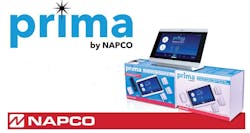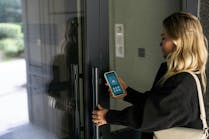2021 Security Industry Business Climate: Camden
The start of a new year is always a good time to look ahead, and after 2020, given how the COVID-19 pandemic ravaged communities and economics, one can be forgiven if that’s ALL they want to do.
This year, Locksmith Ledger plans to publish a series of articles that attempt to assess the 2021 business climate through the eyes of security industry manufacturers. We want to know how each company is faring during these troubled times, how it assesses the security industry at large and plans to move forward and how locksmiths and security pros can be positioned to take advantage of the situation.
Our first interview in the series was conducted with David Price, vice president of communications and corporate development for Camden Door Controls.
What are the prospects for the security industry in 2021?
The COVID-19 pandemic is affecting different segments of the security industry in markedly different ways. Although the industry itself promises to resume levels of historic growth by the middle of 2021, that resumption is dependent upon a strong economic recovery.
What did the industry learn about COVID that will propel it forward?
COVID, obviously, is a horrible thing for so many — people have died from it; people’s health has been affected tremendously by it, but there is a brighter future ahead.
Industrywide, I believe that the pandemic clearly has demonstrated the value of market and product diversification, as well as the importance of being able to pivot easily to a new set of corporate objectives. I think we’re learning new skills and learning new ways of moving forward that we wouldn’t have necessarily seen otherwise.
What did your company learn about it, specifically?
Like a lot of companies, Camden Door learned that we could connect staff remotely and make more efficient use of office space, all at the same time.
Who knew that my customer-service staff could work remotely and not only do as well as we were doing when we were all huddled into a small office together, but actually improve the performance as a group and improve the job satisfaction that each of my customer-service reps have? No one saw that opportunity until we were forced into it.
How much do you expect the pandemic will affect the industry over the next year?
I believe that we will be forever changed by COVID. This is not a short-term proposition, and it’s going to fundamentally change not only how we do business, but the products that we sell and whom we sell those products to. It will be a new normal.
How has or will the way you sell products change?
We talked about the markets where we can see just a tremendous amount of increases — the health-care market and the schools and university markets — those markets have done extremely well. Other markets, particularly the residential market, the independent retail or restaurant markets — those markets have really, really suffered. The companies that have been successful moving through COVID are those companies that have really worked at diversifying the people that they sell to and the products that they sell.
We offer touchless switches. We offer request-to-exit [REX] detectors. We offer Bluetooth-enabled smartphone credentials. We offer column switches that can be operated with an elbow, a knee or a foot, so we offer a very wide selection of no-touch or low-touch products.
It’s not enough to just do one solution and then say, “oh, we’re all done now.” Moving in one direction, selling one type of specific product offering to one specific market makes you extremely vulnerable to a whole host of business factors.
The ability to pivot, being able to pivot your corporate objectives, is really key.
What products do you see as taking center stage in the next year?
We already are seeing a massive shift to door automation, no-touch and low-touch solutions and wireless products in the commercial, school, health-care and transportation markets. We should expect that growth to continue long into the future.
The reality is we’re now a whole market. We’re not just a locksmith market, not just a security market, but virtually every part of building design, whether that be the actual physical layout, the door hardware, the electronics or low-voltage systems. Every part of it is trying to reduce the spread of germs through hands touching devices or doors.
What more do you expect to see with regard to products in the next year?
You’re starting to see companies investing a tremendous amount of resources into coming up with new solutions, so the market should be anticipating that lots of new no-touch and low-touch products are going to be introduced. Some of them will be very, very successful, and most will fall by the wayside as they’re found to not provide the service that’s desired or the quality that’s required.
I use the word “solutions.” We’re working towards eliminating hands touching devices, and there are a lot of different ways of doing that. Or, if hands do touch devices, then we’re seeing antimicrobial finishes, which can, if not kill germs as they touch the surface, at least make it so they don’t last as long on that surface. There’s just a whole range.
In our case, we didn’t think about 36-inch-tall push-plate switches as being a response to COVID-19. It was our customers who started ordering these switches in massive quantities and said, “This is a great solution for when you’re trying to reduce the spread of germs.”
Let’s pull back a bit. What are the prospects for your company in 2021?
Camden Door is experiencing unprecedented growth as a result of the large investments we made in developing no-touch and low-touch door activation and control products.
We really started on the road to no-touch and low-touch door activation and control products about 10, 15 years ago. We were selling products in the health-care side of the business, and we really saw this huge demand for devices that wouldn’t have to be touched — particularly for operating rooms and clean rooms and those types of applications.
And we really saw that there weren’t quality products, products that had built-in features that the market wanted, so we put a tremendous amount of effort into the product development to bring those products to market.
We were as surprised as anyone when we saw a little bit of an uptick back when SARS hit, and we were, like everyone else, completely taken unaware when COVID-19 came to the forefront. But we hit this perfect position with having the exact right product at exactly the right time, so our business, frankly, has been just exploding.
The challenge, I think, for Camden now, because we aren’t known as a large player in the market, is getting our exclusive product features to the attention of the installers, building managers and specification writers.
What makes your products exclusive?
A tremendous amount of R&D went into developing both the sensor technology and the wireless technology behind our no-touch and low-touch products, and that research and development has given us a lot of exclusive features that are really valuable.
A big part of the response to COVID-19 is to retrofit nonpowered switches to touchless switches. Most touchless switches need to be powered. Because we developed our own sensor technology, we reduced the power draw required by the sensor, so we’re actually getting two solid years of battery life using standard alkaline batteries and up to four years using lithium batteries. We’re doing that because we’re pulsing the detection sensor, so it’s really not drawing power until motion is detected.
Then, because we’re a door control company, we have what I call “smart” touchless switches. We have inputs for a REX sensor; we have inputs for a door contact, so you can use that switch for door control or annunciation of when a door is locked, or when a room is occupied.
How does wireless technology play a role in this touchless realm?
Basically, you’re eliminating touching a device by providing a credential, a wireless device, to each of a building’s occupants, so wireless is a really important part of our response to COVID-19 in the retrofit market.
You can use a battery-powered wireless switch. You simply take off the existing nonpowered switch and put in a battery-powered wireless switch, and then that wireless signal can communicate to the door operator or back to an electric strike or an annunciator.
Why is this beneficial, particularly for installers?
You have an ability to very quickly change products in a retrofit, because it eliminates the need for having to run other wires.
You really don’t understand or you really don't know how hard it’s going to be to run wires between two points until you get into the application. When you do wireless, you just eliminate all that doubt. You eliminate any of the questions about how much time a retrofit installation is going to take, because you know it will take a very small amount of time versus answering questions that you have about getting a wire from point A to point B in some walls.
How do locksmiths take advantage of this business landscape?
Locksmiths are already uniquely positioned, because the good ones have an equal foot on the electronic as well as the mechanical side of the world. They really are in a great position to be able to offer easily deployed solutions, whether it’s mechanical hardware or electronic devices.
There’s just so much happening that they need to connect with. I strongly urge locksmiths to connect with distributors and manufacturers to schedule webinar information sessions on new products and services to grow their business.
What’s Camden doing to advance that knowledge base?
We’ve been running webinars, almost weekly webinars now, on no-touch and low-touch solutions.
We just launched a microsite called TouchlessWave.com. This is a great resource for defining a range of products or a range of thinking about no touch or low touch. One of the things that I’m really proud of about that microsite is we built a library. We’re actually collecting articles or white papers that can help keep installers, system specifiers and end users informed about what’s going on, what’s new and what’s the latest thinking about system design and device designs.
Will Christensen | Senior Editor
Will Christensen is senior editor at Locksmith Ledger International. He has been an editor and reporter at magazines and newspapers for more than 30 years.






